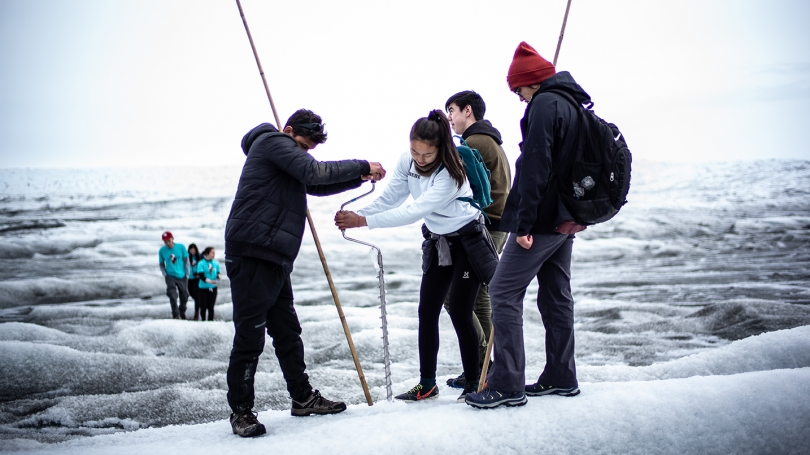
- About
- Programs
- Student Opportunities
- For Faculty
- News & Events
Back to Top Nav
Back to Top Nav
Back to Top Nav
Back to Top Nav
Back to Top Nav
DARTMOUTH PRESS RELEASE
Media contact: Amy Olson | amy.d.olson@dartmouth.edu | 603-646-3274
HANOVER, N.H. – Sept. 9, 2019 – With the Arctic warming twice as fast as the rest of the world, Greenland continues to be an epicenter for climate change research. Each year, hundreds of researchers from the U.S. visit Greenland to conduct fieldwork, often to remote areas of the Greenland Ice Sheet but they rarely collaborate with researchers from Greenland. A new report posted on Dartmouth’s Institute of Arctic Studies’ website calls for more bilateral collaboration between the U.S. and Greenland research communities. The findings will be presented to the public today at the Woodrow Wilson Center in Washington, D.C., as part of an event on “Greenland – U.S. Research Cooperation: Exploring a New Model for Research in Greenland.” There will be a live webcast of the event from 12:30- 5 p.m. EDT; the report will be presented at 2 p.m. EDT.
“As fieldwork continues in Greenland and the next generation of researchers and social scientists are trained, it’s important to recognize ways research can address the needs of local communities. Establishing more U.S. -Greenland research partnerships is integral to understanding the new Arctic,” explained workshop co-organizer and report co-author Lauren Culler, a research assistant professor of environmental studies at Dartmouth. “These collaborations can help make U.S. research in Greenland more relevant,” she added.
Culler will present the report’s findings at the Wilson Center event with co-author Josephine Nymand, chair of the Greenland Research Council and head of the department at the Pinngortitaleriffik-Greenland Institute of Natural Resources.
The report is based on a two-day workshop held at the Greenland Institute of Natural Resources in Nuuk, Greenland last summer, which brought together 19 U.S. and 29 Greenland researchers from academia, government and other institutions to discuss global processes, environmental change and social response. The workshop participants established priorities in research and the co-production of research, public outreach, and education and training, and outlined the following recommendations:
Regarding public outreach opportunities, this winter, researchers from all disciplines have the opportunity to engage the public in Arctic science relating to Greenland during Greenland Science Week, Dec. 2-5 in Nuuk.
Additional information about the workshop recommendations are provided online. The report was co-authored by: Lauren Culler; Sten Lund, research coordinator at the government of Greenland; Josephine Nymand, and Ross A. Virginia, director of the Institute of Arctic Studies and the Myers Family Professor of Environmental Science at Dartmouth, global fellow at the Polar Institute at the Wilson Center, and distinguished co-lead scholar for the Fulbright Arctic Initiative. They are available for comment, respectively, at: lauren.e.culler@dartmouth.edu; siu@ufm.dk; jony@natur.gl; and Ross.A.Virginia@dartmouth.edu.
The workshop was made possible thanks to a National Science Foundation grant from the Office of Polar Programs.